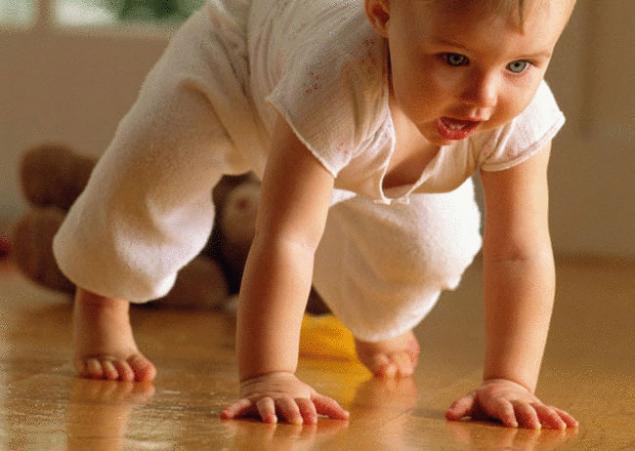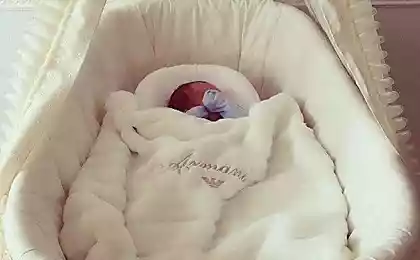594
The child's development in 10 months

The age of your baby is approaching the next round date — ten months is a serious and compelling figure. The child is developing mentally and parents need to be patient. At this age the baby's interest to the surrounding world, that requires special attention and care. It is now emerging the future initiative, activity or a feeling of insecurity and helplessness, therefore, manifestations of independence in any case it is impossible to put down, and you have to send in the required direction and encouraged. What can a baby in 10 months
Your baby is crawling well, alone sits, sits and stands, holding onto a support, crosses along the support. Some kids are already trying to move away from the fulcrum, trying to keep balance. The ability to stay upright is a real achievement, which children are very proud of and it is imperative that parents also emotionally perceived little victory of their child. Now emerging gaming activities early in girls: they feed the dolls, wash them, imitating her mother. There is a rapid speech development: your child is listening attentively to the speech of adults, understand some words and try to reproduce the combination of sounds.
At the age of 10 months the child has formed the following skills:
• ability to sit without support, crawl to the toy, lifting, leaning on the outstretched arms to him, to walk near the pillars, holding her
• knows his name and responds to it, knows the names of loved ones, the names of the surrounding objects can show in the picture called animals, to show parts of his body, at the request of adults
• understands and performs simple requests: "give", "go", etc.
• repeats for older syllables and combinations of sounds
• uses in communicating a few "words" comprehensible situational, at least 1-2 of "words", such as: Lala, mom, give
• take a joke addressed to him and laughs in response
• hums song
• takes small subjects two fingers big and index and makes them meaningful action
• rolls cars, pushes the ball, throws toys
• plays first musical instruments: drum, xylophone
• trying to build out of blocks
• inserts or puts one object into another
• can drink from a Cup, use a spoon
• shows interest and curiosity for the other children to their games
• comfortable vyshibaniem on the potty.
Physical development
After the ninth month of physical growth slows down a bit, now there is emphasis on the mastery of body control movements. On average, during the tenth month the baby gains 400-450 grams of weight and 1.5 cm grows. Thus, the weight by the end of 10 months is about 9000 — 9500 g, and the height is about 70-75 see There is nothing to worry if baby is gaining height or weight a little faster or slower, but be wary if he dramatically knocked out of the normative corridor of growth or weight.
Don't worry if you see a distinct difference between the motor development of children of this age. Someone already goes, and others prefer just to crawl. "Sliders" no need to rush, im just more comfortable crawling than walking. They will go only slightly later. Some children begin to walk at the age of 15 months.
The order of the day
The day may vary individually: feeding, sleep and quantity of sleep. Change yourself for your baby, but be sure to stick to a regular schedule. Feed and put in the same time, breaking the usual mode, or flexible hours will only cause fatigue, moods and a bad mood. Sleep
Usually at the age of 10 months, the children sleep at night from 10 to 12 hours. And two NAPs of about 2 hours. Calm babies sleep longer, stronger, and when waking up for a long time may depart from sleep, not showing activity. With hyperactive kids, the situation is exactly the opposite: they spend more energy and much less restless sleep, you get tired faster and often capricious. In such cases, you can put the baby to bed early for an hour or two. Peaceful, long night sleep promotes bathing before bed and in the bath — airing of the room, then melodic lullabies and feeding — the mother's presence, voice and milk will satisfy the baby, soothe and act as a sedative.
Walking
Despite the fact that now the child interested and at home, do not forget the daily walks. Stay outside the home is becoming more fun. Kids love watching the people, children, exploring the world. Continue to show him new: take him with you to the store, go with him to visit or in an entertainment center for the little ones. In summer, a huge feature development performs a romp in the sandbox. Usually in the sandbox a lot of children and little one can carefully study the rules to emulate and to learn the most simple action: you put the sand in a bucket and build castles, dig with a shovel, etc.
In the summer you can walk for a long time, optimally twice a day for 2 hours. In winter, the number and duration of walks is reduced. On a cold day you can go for 30 minutes, this time will be sufficient to ventilate, and the baby some fresh air.
Feeding
Breastfeeding is still the main (and artificial mixtures for feeding), but by the end of the last decade of the first year is no longer able to provide adequate nutrition. In breast milk is not enough protein, potassium, copper, zinc and other substances in the quantity necessary for a ' big kid. Therefore, we need a substance to go from products that have been introduced before 10 months. New products in the diet almost does not appear, the menu expands only at the expense of new variants of existing dishes from the set. At the age of 10 months, babies should eat every day meat and if there is no diathesis, once a week low-fat boiled fish. Daily required serving of these products is around 50 grams.
Feed your baby 4-5 times a day, alternate meals, offer a variety of vegetable purees, soups, porridges, cottage cheese and fruit which are not allergic.
Daily allowance of food is about 1 liter, excluding breast milk. Perhaps the child will eat at one meal more or a little less than 200-250 grams, it depends on individual physiological characteristics. Do not attempt to feed the baby by force or to leave sensitivity, allow me to develop my own sense of proportion.
The rejection of the breast
Between 9 and 12 months, many children no longer have the need to suck and become more independent in all less stubborn and is quite tolerant of taking away from the breast, than in younger or older age. The decision on the termination of breastfeeding, some women are accepted easily, others have causes great emotional fluctuations. But when whatever happens taking away from the breast, it is important for both mother and child, not only physically, but also emotionally, so take this step seriously.
Games and toys
10 months for full development the child needs the following toys: • toys with wheels: animals, cars that can roll
• balls of rubber and plastic
• sets of jars, bowls and boxes with lids that can be removed and folded to open and close
• a variety of pyramids with snap rings
• cubes
• music and wind-up toys
• rubber animals
• dolls and soft toys.
The role of toys can sometimes perform ordinary household items, dishes, clothes: don't limit a child, make sure that the subject and manipulate him was safe.
Useful games and activities with a 10 month old baby to develop fine motor skills: • shifting, pouring small objects: beads, beans, cereals, pasta from one container to another
• finger painting: paint on paper, as well as drawing on the sand, flour, fine grits
• finger games like "Patty-cake" or "Forty-crow"
• games with ribbons, laces, knots
• play in the sandbox shovel, rake, building castles, filling and playing with the molds.
Be sure to play together with the baby, show him a variety of actions with objects, encourage them to repeat after you, to master increasingly complex procedures. Make sure that the child was surrounded by various toys and objects by: size, color, shape, texture. The rich natural environment at this age contributes to the accelerated intellectual development of a child. Speech development
The games develop it baby. Call items, images of animals, say the sounds, imitating the speech of animals. For example: "It's a mouse, she squeaks: PI-PI-PI". Such verbal games not only promote language development but also for speech hearing and memory. Over time, the baby will not only be remembered as "says" mouse, and will be able to answer this question. Don't forget about reading books, fairy tales, rhymes, looking at pictures. The baby may show where to draw a fish, where's the bird. In his head there is an active process of connecting images and words. Listen to his babbling, encourage any attempt to speak.
Pay maximum attention to the safety of the baby
The baby is not enough dedicated gaming platform, it's time active settling areas. Secure available space: • purchase plugs-fuses for power outlets
• test what happens if the child pull on the edge of the tablecloth or the wire from the lamp
• play with small parts together, the rest of the time ensure that no screws, which can be sent quickly in the mouth, was not in the way of the toddler
• watch out for the sharp, edged objects, do not leave them in plain sight, never leave the availability zone as a hot cereal or a Cup of tea
• medication keep out of reach of children
• on the street as well as at home, pay attention to any hazards. Even in the sandbox you can often see the shards of glass, debris or iron.
The paradox, but the more independent it becomes scarce, the more time it requires. If the first three months the baby just slept and ate, but now he is tireless: crawls, reaches for any available surfaces and objects, opens all the cabinets, pulls out their contents, pulls you in clothes, always says something in its own way, requires games and attention. It is desirable that someone helped you with the baby and at least once a week were released from supervision and training. Rhythm asked the kids, exhausting very quickly, do not allow accumulation of irritation and, especially, venting his anger on his baby.
Source: natural-medicine.ru
Moths and rust helped to create a unique solar panel
Car-Dolphin voted the most beautiful in the world
























